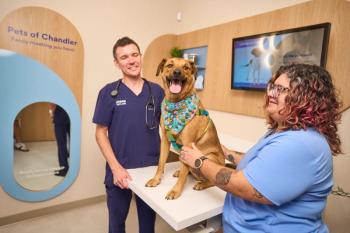
Controlling Subclinical Ketosis in Cattle Can Cut Antimicrobial Use
Researchers find that reducing risk of subclinical ketosis (SCK) in cows can reduce the use of antimicrobials to treat associated infectious diseases.
A recent study published in
“Decreasing the incidence of the metabolic disease decreased the use of antimicrobials up to 40%," writes Didier Raboisson, DVM, PhD, University of Toulouse, France, and colleagues.
SCK in dairy cows commonly occurs around the time of calving or early lactation. It is driven by a negative energy balance at a time when the energy required to produce large quantities of milk for a calf exceeds dietary energy intake. A certain level of negative energy balance is expected at this time, leading to mobilization of body fat to make up the energy deficit. However, if excessive fat mobilization occurs, high levels of blood ketones result, leading to SCK and even clinical ketosis. Cows with SCK are also at an increased risk of developing infectious diseases (such as metritis, mastitis, and retained placenta) that require antibiotic treatment.
However, given the mounting problem of antimicrobial resistance (AMR) in human and veterinary medicine, decreasing the use of antimicrobials has become a key objective worldwide.
According to the authors, a monensin bolus was recently approved in Europe to prevent SCK when administered orally, 3 weeks before calving, in animals at risk for SCK. “This preventative treatment strategy is expected to reduce the use of antimicrobials during lactation by preventing the development of SCK,” they write.
With this in mind, Dr Raboisson and colleagues conducted a study to investigate how metabolic diseases may influence antimicrobial use by limiting the prevalence and severity of infectious diseases. They used a computer simulation model to evaluate infectious disease risk and antimicrobial use in sub-populations of cows that were either at risk, or not at risk, for developing SCK.
The investigators found that using a monensin bolus in cows at high risk for SCK led to a decreased requirement for antibiotics to treat and cure associated infectious diseases. Monensin is a polyether antibiotic that is used as a feed additive in various farm animals—including in lactating dairy cows to control ketosis. It has antimicrobial and anticoccidial activity and causes a shift in rumen microbial populations that leads to increased production of propionic acid in the rumen; this ultimately leads to reduced blood ketone levels and increased blood glucose levels, thereby improving energy capture from feed.
Monensin treatment reduced the percentage of cows at risk for SCK from 80% to 10%.
In addition, the average decrease in use of antimicrobials was 11% when SCK prevalence decreased from 34% to 17%, and was 25% when SCK prevalence decreased from 68% to 22%.
“We showed that preventing metabolic disease is a powerful way to decrease the use of antimicrobials, and suggest that prevention of metabolic diseases such as obesity and diabetes can reduce the threat of AMR in humans,” the authors conclude.
Dr. Parry graduated from the University of Liverpool, England in 1997 and is a board-certified veterinary pathologist. After 13 years working in academia, she founded Midwest Veterinary Pathology, LLC where she now works as a private consultant. She is passionate about veterinary education and serves on the Indiana Veterinary Medical Association’s Continuing Education Committee. She regularly writes continuing education articles for veterinary organizations and journals, and has also served on the American College of Veterinary Pathologists’ Examination Committee and Education Committee.
Newsletter
From exam room tips to practice management insights, get trusted veterinary news delivered straight to your inbox—subscribe to dvm360.






